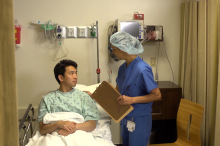
Graves’ disease can cause pain, discomfort, unsightly bulging, and even poor vision. However, a recent study has found that Graves’ disease is also linked to an increased mortality risk. Now more than ever, it is crucial to see a specialist for Graves’ disease treatment. At the Orbital Surgery Center of Excellence in Beverly Hills, the expert oculoplastic surgeons have provided hundreds of patients with a variety of Graves’ disease treatments, including orbital decompression surgery.
For the study, researchers followed nearly 1300 patients with Graves’ disease for an average of 11 years, and found a significant link between the disease and all-cause mortality. They also found that it was specifically associated with increased mortality due to cardiovascular diseases and lung diseases.
These findings are significant because Graves’ disease was not commonly thought to be life threatening. As a result, the surgeons at the Orbital Surgery Center of Excellence in Beverly Hills now recommend that patients suffering from Graves’ disease seek treatment to lower this risk.
What Is Graves’ Disease?
Also known as thyroid eye disease, Graves’ disease is an autoimmune disease in which the thyroid produces an excessive amount of hormones. This causes hyperthyroidism, which can, in turn, cause swollen eye muscles and tissues. Because these swollen eye muscles push against bone, the eyes appear to bulge out of their sockets. This is the main symptom of Graves’ disease.
Advanced cases of thyroid eye disease usually call for surgical treatment such as orbital decompression as well as thyroid surgery. Luckily, the Orbital Surgery Center of Excellence has ear, nose, and throat specialists (otolaryngologists) working side-by-side with specialized cosmetic eye (oculoplastic) surgeons, so our team can handle the entire Graves’ disease treatment in house.
Do I Have Graves’ Disease?
Symptoms of Graves’ disease are similar to other conditions. This makes thyroid eye disease best diagnosed by a trained and experienced specialist.
In some cases of Graves’ disease, the eyes can go completely unaffected. In other cases, many symptoms can revolve around swelling of the eye tissue. Swollen eye muscles can put tremendous pressure on the optic nerve and possibly lead to partial blindness. Eye muscles can be weakened by long periods of inflammation and lose their ability to control movement, resulting in double vision.
Other symptoms of Graves’ disease can include:
- Pain in the eyes when looking up, down, or sideways
- Dryness, itching, or difficulty wearing contact lenses
- Inflammation and swelling of the eye and its surrounding tissues
- Swelling in the orbital tissues
- Bloodshot appearance to eyes
- Double vision
- Impaired vision
Graves’ Disease Treatment in Beverly Hills
In light of the recent findings linking higher mortality rates and patients with Graves’ disease, you should seek treatment from an expert team of otolaryngologists and oculoplastic surgeons if you have these symptoms. Though mild cases of Graves’ disease can treated with anti-inflammatory or lubricating eye drops, people with the disease may want to seek a more permanent treatment option through an oculoplastic surgeon.
Steroids or surgical options (such as orbital decompression) are often best for patients with more severe symptoms (such as a threat to vision). These options are also explored to relieve any type of pressure on the optic nerve or if the cornea is exposed.
Aside from the eyes, treatment of Graves’ disease also focuses on the thyroid gland itself, sometimes through medication and sometimes through minimally invasive surgery. Many times, a patient with Graves’ disease will have a team of doctors including an endocrinologist and a head and neck surgeon. At La Peer, patients have that luxury.
Orbital Decompression for the Treatment of Graves’ Disease
Orbital decompression is a surgical treatment option performed by the oculoplastic surgeons at our Beverly Hills surgical center. It involves removing bone around the eye socket to make more space for the swollen tissue and allow the eyes to move back into their original position. Our surgeons use the latest and most minimally invasive techniques to achieve the desired effect. As a result, most patients only have about 7-10 days of postoperative swelling/bruising.
In severe cases of thyroid eye disease, pressure from swollen eye tissue can press against the optic nerve causing partial blindness. To avoid this, our surgeons at the Orbital Surgery Center of Excellence make small incisions around the eye to remove some of the bone to relieve that pressure.
Orbital Surgery Center of Excellence
If you are experiencing the symptoms of Graves’ disease, it is important that you see a specialist who can give you a proper diagnosis and inform you of your overall health risks.
If you are interested in Graves’ disease treatment in Beverly Hills, speak with our highly trained doctors at the Orbital Surgery Center of Excellence to learn more about your options. We can be reached by phone at (888) 559-4341 or by filling out our website contact form.














